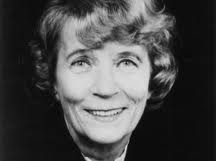 Roland Barthes said that only once the voice loses its origin does writing begin. If that’s the case, then hopefully the late British author and critic Christine Brooke-Rose will be able to collect on some of the recognition she deserves.
Roland Barthes said that only once the voice loses its origin does writing begin. If that’s the case, then hopefully the late British author and critic Christine Brooke-Rose will be able to collect on some of the recognition she deserves.
It’s no huge surprise if you haven’t heard of her. I only recently discovered who she was, just in time to recognize the significance of her passing last month at the age of 89. Her books have never really been bestsellers, and her influence on academia has been neglegible, especially after her move to the South of France in 1988. Her biography can tell you something about the general trajactory of her life: her struggle to balance adventure with stability, her playfulness and intellectual curiosity, the husbands that she adored, etc. And the details really are interesting. The time she spent doing intelligence analysis at the famed Bletchley Park, in particular, stands out in my mind as an early biographical experience that shaped her thinking. But of course, any biographical recounting of her life by itself would diminish the power and importance of her ideas and writing.
Her first published works were a novel and a nonfiction book that were released at the same time. And although both books show early signs of her hallmark playfullness and crystalline lyricism, they were rather pedestrian in subject and execution. It wasn’t until after she suffered a life-threatening illness that she spurned the post-war British literary orthodoxy. The illness, the specifics of which are only vaguely refered to in obituaries, caused a shift in consciousness. According to her, she achieved a “sense of being in touch with something else.” This life-changing mental shift, along with the hours spent alone in bed, led to a novel, Out (1966), in which she finally found her literary self. Her voice was there, challenging you in a playful way, telling jokes and making puns, seducing, scaring, and winking.
After that, the work poured out. Criticism, novel, and translation were published by the truckload. One of my favorite critical works of hers is A ZBC of Ezra Pound, which avoids the usual heavy-handed oneupmanship of most Pound scholarship, and as plainly as possible presents Pound to the non-expert. It’s as beautiful as anything that she’s written in her long and distinguished career.
The work of Christine Brooke-Rose reminds us that the joy of literature isn’t in recognition and confirmation, but in playful discovery. She worked against the tradition of her country, choosing France as both her physical and spiritual home. She wrote a lot and wrote it well; we can’t celebrate her enough.
This post may contain affiliate links.








